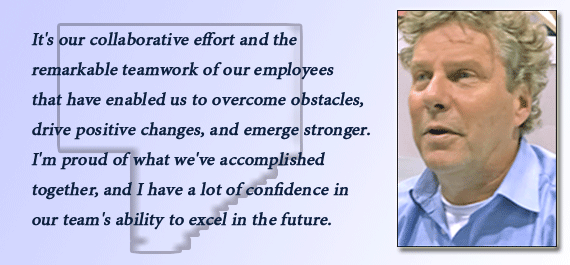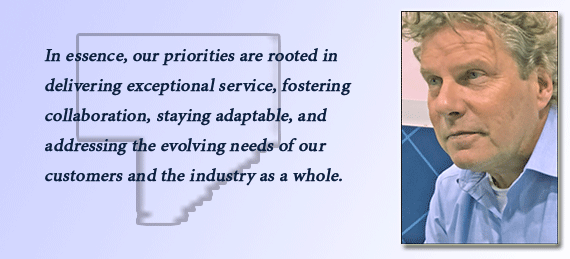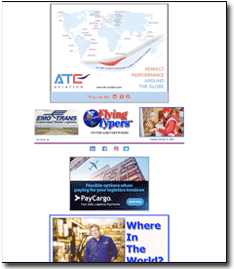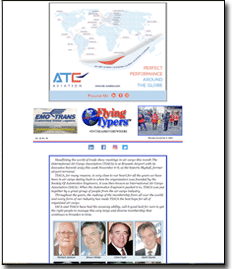 |
The
first thing you'll notice if you walk with Jan Krems is that he is probably
moving faster than you are.
It seems that whether connecting to an appointment
or just going out to lunch or even on his way to relax somewhere (an unlikely
possibility), Jan is determined to get there soonest!
Once we were both at a convention somewhere
and it was 0500, and as we passed each other moving silently in opposite
directions during an early morning constitutional, I felt the rush.
For a long time now, been wondering what
makes the man tick who made history during the pandemic, and yet today
is rewriting the script as United Airlines Cargo President with imagination
and brilliance, as he pivots and inspires?
But is Jan racing with the clock?
At my age you think about those things.
I think not.
His approach is total engagement whilst
having the time of his life advancing air cargo.
Lucky for tomorrow, Jan Krem's air cargo
looks better every day.
FT: How would you characterize 2023 in the overall
scheme of things? What do you know now that is guiding your moves for
the rest of the year and shall serve to continue into 2024? (How is 2023
and what do you expect in 2024)
JK: This
is a year of resetting and adaptation. After the turbulent events of the
past couple of years, our primary focus for this year has been to return
to normalcy—or at least get as close to it as possible.
Our approach in 2023 has been many-sided.
We've taken a look at various markets, seeking opportunities for business
growth, identifying areas where we can tap into additional capacity on
our existing routes, and exploring new partnerships that can increase
our operations. One trend we've observed is the return of some business
from freighters to airlines, as some players the industry may have overcommitted
to customers and struggled to maintain profitability.
Throughout this year, our commitment to
delivering added value has continued to pay off. We've managed to maintain
a respectable level of yields, even in a challenging business landscape
where price wars are a constant threat. Many airlines seem to be in a
race to acquire business at any cost, even if it's not financially sustainable—I
won’t name them—but they are not profitable. Our focus on
value addition has been a key differentiator.
The importance of relationships has been
more evident than ever. We've witnessed both positive and negative examples
of how partnerships can shape the industry. Navigating this tough year
has been challenging, especially when compared to the heights we previously
achieved. However, the support and understanding of our board members,
who recognize the need for adaptation during this reset year, have been
invaluable.
Looking ahead to 2024, I am cautiously optimistic.
We don't anticipate a significant shift in our budget compared to 2023.
We believe that we've already witnessed the bottoming out of yields, with
some regions, notably Asia, even showing signs of yield improvement. As
China and other Asian countries gradually open up further, we anticipate
a gradual return to this region.
We look forward to 2024 with cautious optimism.
We expect a focus on stability and an eventual return to growth in key
markets.
 |
FT: What
would you say as top United Cargo executive to the fellow air cargo community
as what everyone should be focusing upon to advance air cargo moving forward?
(What should everyone be focusing upon to advance air cargo moving forward)
JK: As
an industry, we should collectively focus on:
•
Recognize the Value: COVID-19 demonstrated the important role air
cargo plays in global supply chains. We must continue to emphasize and
communicate the value of air cargo to businesses and governments alike.
•
Sustainability: Sustainability is not just a buzzword; it's a necessary
requirement for the future. Invest in eco-friendly practices and technologies
to reduce the industry's carbon footprint.
•
Connectivity: Strengthening connectivity and collaboration across
the air cargo ecosystem is key. The ability to seamlessly integrate and
share data and resources will drive efficiency and reliability.
•
Digital Transformation: Embrace digitalization to streamline processes,
reduce paperwork, and expedite transactions. Being faster, more efficient,
and less reliant on manual paperwork is the way forward.
•
Cost Efficiency: In an increasingly competitive landscape, focus
on cost efficiency. Seek ways to make deals that benefit both you and
your customers, ultimately driving down costs and providing competitive
pricing.
By embracing these ideas, we can advance
air cargo as an industry. United Cargo is playing an active role in driving
these advancements, and we encourage all stakeholders to join us on this
journey.
 |
FT: What
surprised you post COVID as pax capacity and pax travel came back? The
impact on cargo . . . rates adjustments, etc.
JK: The
post-COVID era has brought about some surprising shifts in the aviation
industry. One of the biggest has been the enthusiasm of passengers to
resume traveling. Despite the uncertainties of the pandemic, people want
to explore, connect with loved ones, and experience new destinations.
Also unexpected was the rapid return of business travel—we predicted
it, but it is good to see that it happened. While virtual meetings and
collaboration tools like Microsoft Teams and Zoom had become essential
during the pandemic, it was surprising to witness how swiftly business
passengers expressed their eagerness to return to face-to-face meetings.
In-person meetings for building relationships and closing deals is important
in every industry.
On the cargo side, there was an unexpected
drop in air freight yields as passenger travel demand picked up. This
was due to the increased availability of cargo space on passenger flights,
intensifying competition and lowering yields.
The post-COVID landscape has highlighted
the resilience of the travel sector.
FT: Two words
that seem to continue to be on everyone’s lips “Sustainability”
and “Digitalization”. United has certainly been on the forefront
of emissions reduction, carbon footprint advocacy and the investment in
electric. Can you comment on both subjects?
JK: We
believe the industry needs to be bolder when it comes to climate change;
our strategy to become 100% green is centered around four key pathways:
A.
Reducing our environmental footprint with
investments in Sustainable Aviation Fuel (SAF),
B.
Innovating transformative carbon reduction
technology,
C.
Removing carbon emissions in the atmosphere,
and most importantly:
D.
United seeks out suppliers with commitments
to sustainable business practices in order to enhance the sustainability
of United’s operations, products, and services. Collaborating with
our partners: freight forwarders, Cool-chain container providers, passengers,
airports, and policymakers to facilitate faster action and the commercialization
of technology solutions concerning climate change.
From a cargo perspective, collaboration
is key. We must work together to and empower and define how customers
and shippers make smarter choices to reduce emissions.
Digital innovations in the air cargo industry
can increase revenue by improving operational efficiency and enhancing
the customer experience online. Digital automation in cargo handling and
documentation ultimately reduces labor costs, removes human error brought
on by manual work, and streamlines processes. Digital
solutions enable better forecasting, optimizing cargo capacity, and pricing
strategies which all ultimately lead to increased revenue opportunities.
Prioritizing digital capabilities will help the freight industry adapt
to changing market dynamics, meet customer needs and drive revenue growth.
FT: United
is positioning itself in Asia. What are your initiatives for cargo in
that region?
JK: Our
key message is clear, we are back again. We have in our pockets the biggest
increase of flight activity in the past years. We are going to increase
flights more than double in Oceania and increase flights in Hong Kong,
Taipei, Shanghai and Tokyo. We are restarting Beijing again and start
new services to Manila. As more countries open up, we will look at restarting
routes and expanding our network.
FT: Can you
share other priorities?
JK: Our
priorities at United Cargo are driven by a commitment to excellence and
customer satisfaction. First and foremost, we maintain a customer-centric
approach, placing our customers' needs, preferences, and challenges at
the forefront of our operations. Building strong relationships within
the industry is another core focus. Collaborative partnerships with stakeholders,
including airlines, logistics providers, and government agencies, form
the foundation of our growth and innovation efforts. These relationships
open up new avenues for us to better serve our customers.
Adding value is an fundamental aspect of
our approach. This includes providing specialized services, offering end-to-end
solutions, or creating unique selling points that set us apart from the
competition.
Quality assurance is non-negotiable for
us. We uphold consistently high standards of quality throughout our operations,
from cargo handling to shipment tracking. This unwavering commitment builds
trust and reliability.
Adaptability is a vital trait in the ever-evolving
air cargo industry. Staying ahead requires agility and a keen eye on market
trends. We proactively explore emerging opportunities and remain ready
to pivot as needed.
Having a global perspective is imperative
in our increasingly interconnected world. We closely monitor global shifts
in manufacturing and trade, especially the relocation of factories, such
as those in Asia. This presents both opportunities and challenges that
we are prepared to address effectively.
Our approach also emphasizes the importance
of two-way agreements with customers, moving beyond one-way transactions
to create mutually beneficial partnerships that leverage our strengths
and add value to both parties.
Expanding our global footprint with the same
customer in different regions is a winning strategy.
Additionally, we are focused on enhancing
our e-strategy, facilitating direct connections with customers' systems,
and offering innovative ways to book shipments.
Sustainability remains a top priority, aligned
with the crucial need for environmental responsibility in the aviation
industry.
Keeping our customers close and increasing
the range of added-value products, including our Specialty offerings like
TempControl, QuickPak, LifeGuard, and LifeGuardXL, are integral to our
service portfolio.
In essence, our priorities are rooted in
delivering exceptional service, fostering collaboration, staying adaptable,
and addressing the evolving needs of our customers and the industry as
a whole.
FT: You came
to your post as a professional agent of change. What you headed up was
going through IT changes, rapid expansion, adding new destinations both
at home and abroad and then had to exist during a global pandemic during
which the employee demographics changed drastically. Give yourself and
the team a report card.
JK: When
reflecting on the challenges and transformations we've experienced, I
would give myself a rating of 8. However, I firmly believe that it's the
extraordinary dedication and perseverance of our team that deserves the
highest praise. I would rate my team a 10.
Our team has been the driving force behind
the IT changes, rapid expansion, and the successful addition of new destinations,
both domestically and internationally. They have consistently demonstrated
a commitment to innovation, excellence, and adaptability. Even in the
face of the global pandemic, when employee demographics changed drastically,
our team rose to the occasion.
It's our collaborative effort and the remarkable teamwork of our employees
that have enabled us to overcome obstacles, drive positive changes, and
emerge stronger. I'm proud of what we've accomplished together, and I
have a lot of confidence in our team's ability to excel in the future.
Business report: What parts of the world
look good moving forward in 2024?
When we assess the global landscape for 2024, several regions stand out
with promising prospects:
•
SE Asia appears to be on a positive trajectory and a key focus for
United Cargo.
•
Certain parts of Europe, including France and Italy, show particularly
encouraging signs.
•
Specific regions within the United States are displaying positive
indicators.
•
India's economic potential and burgeoning middle class continue
to make it an attractive market. However, it's important to note that
geopolitical conflicts, such as airspace restrictions due to tensions
involving Russia, have impacted operations in this region.
•
An increase in stability and economic activity in certain Middle
Eastern countries could translate to growth opportunities for air cargo.
While these regions hold promise, it's important
to note that the geopolitical landscape and other external factors can
influence the air cargo industry's trajectory. We remain adaptable to
navigate any challenges that may arise, ensuring that we continue to deliver
reliable and efficient cargo services to our customers worldwide.
GDA |





 Vol.
22 No. 39
Vol.
22 No. 39